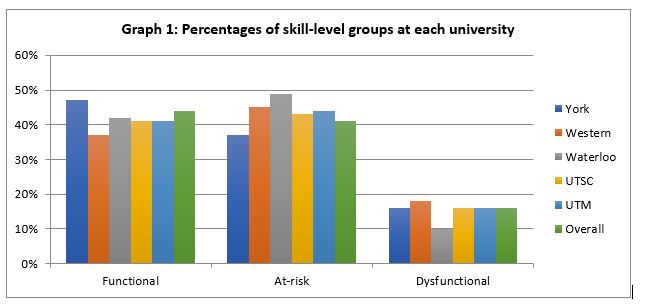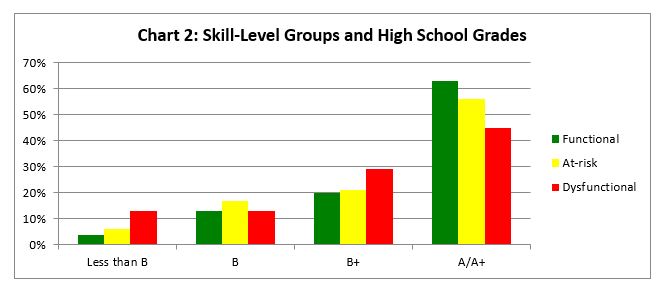TORONTO, April 25, 2019 – A survey of students at four Ontario universities has found that more than half feel they lack competence in basic academic skills that would enable them to succeed in university and beyond.
Researchers from York University, Western University, the University of Waterloo and the University of Toronto (Scarborough and Mississauga campuses) surveyed 2,230 students at their universities to learn how confident they were with their writing, test taking, analysis, time and group management, research, presentation and numeracy skills.
Based on the students’ responses, an advanced statistical classification algorithm allowed researchers to conclude in their study that only about 44 percent of students felt they had the generic skills needed to do well in their academic studies, 41 percent could be classified as at risk in academic settings because of limited levels of basic skills, and 16 percent lacked almost all of the skills needed for higher learning.
The study team, co-led by York University Department of Sociology Professor J. Paul Grayson and Western University Department of Sociology Professor James Côté, included professors Robert Kenedy of York University, Liang Hsuan Chen of the University of Toronto Scarborough and Sharon Roberts of the University of Waterloo.

Using the results of the student survey, the researchers concluded the skill deficiencies of students at each of the four universities were about the same. Family background had no noticeable influence on the skill level and neither did factors such as being a first-generation university student or an international student.
Not surprisingly, students with inadequate skill levels got relatively low grades, frequently thought of dropping out, and were generally dissatisfied with their university experience. In other words, skill levels as measured in the study were predictive of important university outcomes. Over two-thirds said they would welcome a first-year course in academic skills such as effective studying, critical thinking, writing and university standards.

The researchers point out that Ministry of Education policy documents show that most of the skills in which they are interested are objectives of the secondary school system in Ontario. Still, students can obtain good high school grades and still be deficient in these skills. In other words, high school grades do not reflect the development of many skills embodied in Ministry objectives. Arms length evaluations of students would be one way of ensuring that grades reflected the Ministry’s objectives.
"Students want help. They want to do well in school, future jobs, and in their roles as citizens,” said Grayson. “Students recognize they are lacking sufficient skills including literacy and numeracy, which are part of Ontario’s secondary school curriculum and key factors for academic and job success.”
The researchers surveyed students in humanities, social sciences and professional studies programs.
“The most shocking findings were that many of the students who were surveyed and said they have low levels of academic skills also reported being given very high grades in high school,” said Côté. “Some of the same students apparently can make their way through university without much trouble and without acquiring basic academic skills.”
Student participants with serious skills deficits earned high grades in secondary school, according to the survey. In high school, 63 percent of students classified as functional earned grades of A or A+; however, 56 percent of the at-risk students and 45 percent of the dysfunctional students also made those grades.
The research team also discovered that the skill gaps did not improve with more time spent in university. About the same percentages of students in all year-levels of university were considered deficient in their academic skills.
Additional quotes from researchers on the study:
"The data regarding student skills is disturbing, even though we suspected this was the case through our anecdotal experiences. We need to make sure student skills courses are available in order to ensure student success and resilience."
– Robert Kenedy, York University, Associate Professor, Department of Sociology
“There is a troubling skills deficit - pervasive among domestic, first generation and international students. The need to provide more support to students across the board is clear and urgent.”
– Liang Hsuan Chen, University of Toronto Scarborough, Associate Professor, Department of Management
“These preliminary findings confirm that a significant proportion of our undergraduate students face challenges related to fundamental academic competency skills at all levels of undergraduate study. Our findings suggest that many students need extensive supports in place before and after they enter university.”
– Sharon Roberts, University of Waterloo, Associate Professor, Social Development Studies Department
York University champions new ways of thinking that drive teaching and research excellence. Our students receive the education they need to create big ideas that make an impact on the world. Meaningful and sometimes unexpected careers result from cross-disciplinary programming, innovative course design and diverse experiential learning opportunities. York students and graduates push limits, achieve goals and find solutions to the world’s most pressing social challenges, empowered by a strong community that opens minds. York U is an internationally recognized research university – our 11 faculties and 25 research centres have partnerships with 200+ leading universities worldwide. Located in Toronto, York is the third largest university in Canada, with a strong community of 53,000 students, 7,000 faculty and administrative staff, and more than 300,000 alumni.
York U's fully bilingual Glendon Campus is home to Southern Ontario's Centre of Excellence for French Language and Bilingual Postsecondary Education.
Media Contact:
Janice Walls, York University Media Relations, 416 455 4710, wallsj@yorku.ca

